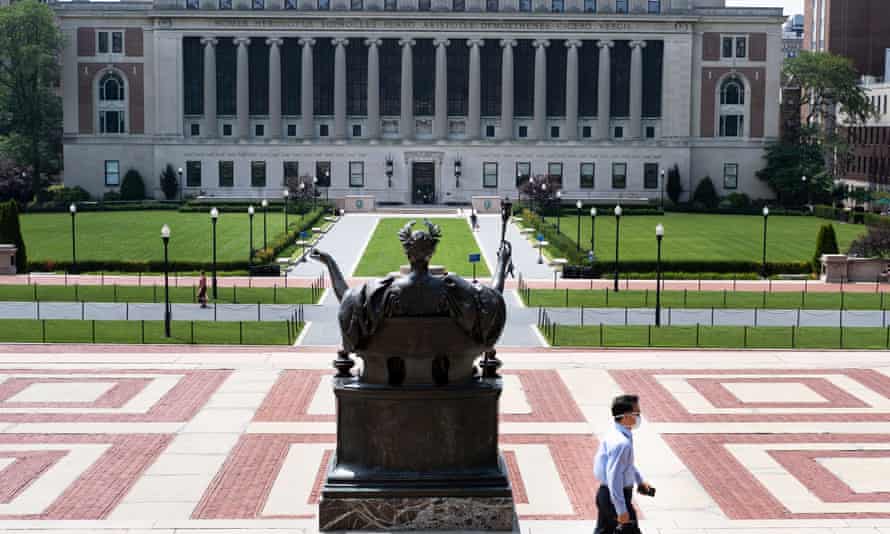
Graduate workers in America’s higher education system are organizing in response to high tuition fees, cuts to staff and faculty positions, reduced budgets and suppressed graduate workers’ right to organize unions. College and university administrations have introduced the measures in response to the coronavirus pandemic.
Job losses have been substantial at US universities and colleges, as student enrollment has declined and reduced public funding for higher education at the state level is leading to drastic budget cuts.
The National Student Clearinghouse Research Center reported in December a decline in enrollment of students at postsecondary institutions of 2.5% compared with fall 2019, driven largely by sharp drops in enrollment of undergraduate freshmen at public two-year institutions.
Between February and November last year, employees at colleges and universities in the US declined by more than 188,000, not including affected workers employed by contractors.
Graduate workers at the University of New Mexico (UNM) are currently awaiting hearings before the state public employees labor relations board at the end of March, in regards to the school administration attempting to use a rule proposed by the board under the Trump administration, which declared graduate workers are not workers, therefore they do not have the right to organize unions.
The move comes after the University of New Mexico provost asserted the university recognizes the rights of graduate students to organize in October last year.
“Some of the issues that we face are just being overworked and expected to work overtime without compensation for that overtime,” said Ramona Malczynski, a graduate worker in geography and environmental studies and a union organizer.
“We receive about $6,000 to $8,000 annually in stipends, less than the living wage in Albuquerque. We don’t have good healthcare benefits, we don’t have dental or vision coverage. There are no protections against discrimination or mistreatment, and it’s widely known that graduate students are treated really poorly at any university.”

Workers publicly announced their intent to unionize in October, and secured a majority of signed union authorization cards by December, though the University of New Mexico declined to formally recognize the union seeking to represent about 3,750 graduate workers.
University of New Mexico spokesperson Cinnamon Blair said in an email: “The issue of whether graduate students are ‘regular employees,’ and thereby eligible to unionize and bargain collectively under New Mexico law, is an undecided legal question. Regardless of how that question is decided, UNM will continue to both value and collaborate with its graduate students to ensure that their time at UNM is both personally fulfilling and advances their academic and professional goals.”
Budget cuts and layoffs
Colleges and universities across the US are also cutting staff and faculty positions over budgetary concerns. The cuts have extended to private and public institutions, large and small. The pandemic has cost US universities and colleges an estimated $120bn in lost revenue.
After months of looming cuts at Marquette University in Milwaukee, Wisconsin, 39 workers in various departments received layoff notices on 21 January 2021. Faculty and students have held protests against the cuts and firings over the past several months.
“It was a very immediate and harsh cutoff from campus and the community, and there was very little ability to provide feedback in the process,” said one of the laid-off employees. They requested to remain anonymous as the employees were forced to sign non-disclosure agreements to receive severance pay.
A Marquette University spokesperson said in an email: “There are no further layoffs planned at this time.”
At Ithaca College in Ithaca, New York, the administration is cutting 116 non-tenure faculty positions over the next year out of 547 faculty positions at the school, citing the apparent coronavirus-accelerated need for the college to downsize amid budgetary concerns. Students, faculty, and alumni have criticized the cuts, pushing for more transparency and collaboration with students, faculty and alumni in finding alternative solutions.
“We’re frustrated and hoping for a more collaborative response to all of this,” said Juan Arroyo, a politics professor at Ithaca College for 20 years who is expected to lose his position when his current contract expires at the end of the 2021-22 school year. “My contract ends when I’m 59 years old. So I’m starting to think of things that I wasn’t thinking about – like what is the earliest I can draw from social security, Medicare eligibility, all kinds of stuff like that, it’s now on the front burner.”
A spokesperson for Ithaca College said in an email: “The facts demonstrate that the current size of the college is not sustainable. So the difficult but necessary steps are being taken to align our academic offerings with student interest and institutional need.”
Strikes over tuition and fees
University students and workers are currently organizing strikes against exorbitant tuition fees during the coronavirus pandemic as some universities, such as Georgetown and Williams College, have reduced tuition and fees as many student activities remain cancelled and several classes are conducted remotely.
Graduate workers at the University of Chicago are organizing a pledge to refuse to pay student fees to the university, which are currently $416 per quarter, citing the reduced services for students due to the pandemic and the high cost of the fee. According to the union, over 600 graduate workers and students have signed onto the pledge.
“These are crises that have been coming to a head for a long time and Covid has really highlighted them. Tuition and exorbitant fees are getting higher and higher,” said Laura Colaneri, a graduate worker in Hispanic and Luso-Brazilian studies.
A spokesperson for the University of Chicago told the Guardian in an email: “Students at the University of Chicago have access to many critical services that are made possible by the student services fee.” They did not comment on what services are currently limited or halted due to the pandemic.

More than 1,000 students at Columbia University are currently withholding their spring semester tuition as part of a strike to demand a 10% reduction in tuition fees and a 10% increase in financial aid.
“The tuition strike is an effort to push back against the idea that administrators should unilaterally be making decisions with the financial resources that come out of teaching by faculty, tuition payments from students, the expropriated land of the surrounding community, and hard work of campus workers,” said Becca Roskill, a junior at Columbia University and one of the organizers of the strike.
Without financial aid, tuition for undergraduates at Columbia University currently costs over $80,000 a year. The tuition strike movement also includes demands to reduce funding of campus police, divest school funds from fossil fuels, improve working conditions for graduate and undergraduate workers, and for the university to commit to transparency in regards to its investments.
Students taking part in the strike have claimed the university has already begun to impose $150 late fees for unpaid tuition.
“Our best safeguard against these sorts of measures is our collective strength. There’s been a really impressive will among strikers to continue striking through this,” added Roskill. “We’ve been staying in contact with committed strikers and we’re also trying to provide assistance to anyone struggling to pay late fees.”
A Columbia University spokesperson said: “This is a moment when an active reappraisal of the status quo is understandable, and we expect nothing less from our students. Their voices are heard by Columbia’s leadership, and their views on strengthening the University are welcomed.”
-
This article was amended on 24 February 2020 to clarify that the UNM school administration attempted to use a rule proposed, not passed, by the board under the Trump administration.